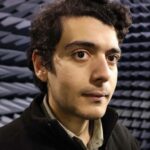Technical Lectures
Technical lecture 1: MHz to mm-Wave Wireless Power Transmission and Harvesting in Electromagnetically Harsh Environments using Large-Area Electronics
Mahmoud Wagih
University of Glasgow, U.K

This technical lecture presents a holistic overview of RF energy harvesting and its applications in low-power wireless sensing. From how to co-design antennas and rectifiers for maximum RF-DC efficiency, to associated power management and sensor node integration, a holistic coverage of rectenna design will be presented. First, an overview of rectenna topologies will be provided, presenting a clear definition of each class of rectennas and its design requirements. State-of-the-art methodologies for designing, simulating, and optimizing antennas and rectifiers will then be introduced, providing a clear approach to designing scalable rectennas with best-in-class efficiencies. Tightly-coupled rectenna arrays will also be discussed for voltage and current-boosting in ultra-low-power energy harvesting applications. Simultaneous Wireless Information and Power Transfer (SWIPT) rectennas will then be detailed. The potential for minimizing the complexity of SWIPT and improving its RF-to-DC efficiency based on shared-aperture antennas, including dual-band and dual-polarization systems, will be explained. The challenges specific to electromagnetically harsh environment such as reflective metallic environments and absorptive biological media will be discussed from an antenna design perspective. Moreover, methods of overcoming RF insertion losses on lossy substrates and conductors will be discussed, in the context of wearable rectenna design. DC power management strategies, based on the target RF power levels, will be discussed highlighting the trade-off between sensitivity (i.e. wireless range) and efficiency (i.e. charging rate), in RF-powered sensing systems. The lecture will conclude by showing emerging cutting-edge applications of low- power wireless power transfer including autonomous robotics, wearable therapeutics, and terrestrial applications.
Dr. Mahmoud Wagih (GS’18, M’21) received his First Class B.Eng. (Hons.) in September 2018, and his Ph.D. on rectenna design in April 2021, both in Electrical and Electronic Engineering from the University of Southampton. He worked as a Research Assistant at the University of Southampton Malaysia, 2017, a Hardware Engineering Intern at Arm, 2018, and, in 2020, a Devices Research Intern at Arm, Cambridge, U.K. He was a Research Fellow, in 2021, and promoted to a Senior Research Fellow at the University of Southampton, U.K. in 2022. He is currently a Proleptic Lecturer (Assistant Professor) and UK IC Research Fellow, at the University of Glasgow, U.K, leading the Green RF-Enabled Electronics Lab. His interests broadly cover antennas and microwave technologies for sustainable electronics, and has over 70 refereed publications. Dr. Wagih is a Senior Member of URSI and an affiliate member of the IEEE Microwave Theory & Techniques Technical Committees TC-25 and TC-26. He was the recipient of the Best Undergraduate Project Prize, School Winner Doctoral Award for Electronics and Computer Science, Best in Faculty Doctoral Research Award, and the Dean’s Award for Early Career Researchers, in 2018-2021, at the University of Southampton. He received the Best Student Paper Award at the IEEE Wireless Power Transfer Conference (WPTC), 2019, the Best Oral Presentation Award at PowerMEMS, 2019, the IEEE MTT-S Best 3MT Presentation Prize (2nd place) at the IEEE Microwave Week, 2020, the Best Paper Award at PowerMEMS, 2021, the EurAAP Best PhD [in Europe] in Antennas and Propagation “Per- Simon Kildal Award”, 2022, the URSI Young Scientist Award, in 2022, and was a U.K. TechWorks Young Engineer of the Year finalist, in 2021.
